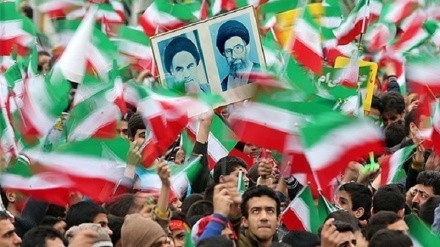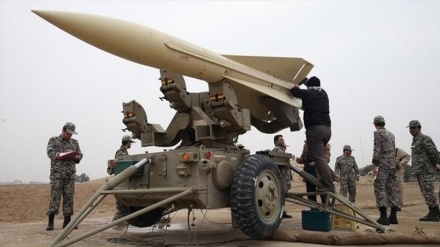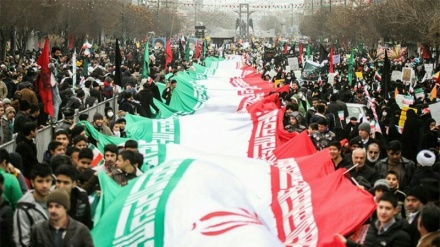Iran 40 years after victory of the Islamic Revolution (5)
Since the victory of the Islamic Revolution in 1979, the American ruling system, whether Republicans or Democrats, have used threatening language as the Islamic Republic has severed the US hand from Iran.
With the coming to power of Donald Trump in 2016, questions were raised on the likely change in the US behavior vis-a-vis Iran. Mary Cecil Nav, French sociologist, says on the character of Trump, "Donald Trump, by confrontation with Iran, wants to transform the balance of West Asia not with the aim of geopolitical changes but for attaining economic goals which are compatible with his spirit and personal mindset."
The fact of the matter is that the emergence of Trump is the legacy of the American policies. There is little difference between Trump's conduct and those of his predecessors. This, while Trump knows nothing on politics and world affairs. The American officials, both the past and the present, have left no stone unturned to weaken Iran; but as the Leader of the Islamic Revolution said, "Let everybody, including the sincere friends and those friends whose hearts shake at times, know that the Islamic Republic stands firm and with full might and the enemies cannot slap in the face of the Iranian nation; rather the nation will slap them in the face."
The United States is aware of the capacities and abilities of the Islamic Republic and knows that it can't achieve any success unilaterally. That's why the US makes much effort to ally with the regional and world countries against Tehran to attain legitimacy. In this course, some of the regional Arab regimes like Bahrain, are indulged in daydreams of attaining a position, though insignificant, in consonance with the US hollow allegations against Iran. Thus, the United States of America is relying on forging alliances with some of the Arab regimes and the Zionist regime. Arab News website wrote that although Washington is seeking to forge a global alliance against Iran's system, the American State Department claims that it won't launch this 'global' alliance against the Iranian system but it tries to use it along with the Iranian people. This Arab website continues that the main goal of the US president, after violating the Iran nuclear agreement, is to conclude a new agreement against Tehran with deeper restrictions.
The regional allies of Washington maintain that they can survive only through forging trans-regional crises. The United States makes use of every means to reach its objectives. It considers a good opportunity to have the child-killer regimes on his side. Thus, making alliances with the Saudi regime and the Zionist regime are part of the American strategy in the Trump era. The US measures are concentrated round creation of tensions in West Asia. For several decades, the American policies in support of the fake Zionist regime in Tel Aviv and repressive regimes in the region have caused mayhem, war, bloodshed and terrorism. Today, there is no doubt that the allies and accomplices of Washington are the creators and sponsors of terrorism in the region and the world.
Trump administration has not changed the major US policies towards the Islamic Republic but he has disclosed the real nature of American hostility more than ever. The US Secretary of State, Mike Pompeo, during a speech at Reagan Library in California revealed that the White House seeks to intensify its anti-Iran policies in various domains.
South China Morning Post wrote in a report that the US officials have spoken indirectly of a likely consensus resembling the coalition in Iraq and Syria which claimed to act against Daesh while, in reality, it supported and sympathized with the terrorist outfit.
The Iranophobia has always been one of the main axes of the US strategy in the region, though it has been aggravated since Trump's coming to the White House. After failure in the project of sabotaging Iran nuclear deal, the United States pursues two goals. The first US goal is continuation of demonization of the Islamic Republic in West Asia and the second goal is soft opposition against the increase of Iran's regional and global role.
The issue that can be boldly seen in Trump's anti-Iran policies is the hasty move of the Great Satan (the US) to commercially exploit regional and international developments. Donald Trump looks at everything from the eyes of trade and economic profiteering. His first foreign trip proved this claim as he travelled to Riyadh and, hoodwinking the gullible crown prince Bin Salman, singed the sale of 110 billion dollar arms deal with the upstart boy. Thus, the Trump's remarks in accusing Iran of supporting terrorism is not a new issue. For the past three decades, the United States has piled up allegations against the Islamic Republic with the false claims of Iran's effort to gain atomic weapons, its support for terrorism and violation of human rights in Iran. What the US and its accomplices have added to this list of never-proved claims is their "concern" over Iran's missile capability and the powerful and stabilizing presence of the Iranian navy in the waters of the region.
The pressures of the US and its partners-in-crime against the Islamic Republic began with their all-out support for Saddam in the 8-year war they themselves had staged to topple the nascent Islamic Republic system. These supports persisted in the form of equipping Saddam with chemical weapons. Furthermore, the Global Arrogance- spearheaded by Washington- tried to suffocate Iran's economy through illegal sanctions in a bid to disappoint people about realization of the goals of revolution seeking to decrease their participation in various elections. The US has never ceased its enmity against the Islamic Republic. The experiences of recent years in the region, fabrication of terrorist groups like al-Qaeda and Daesh and staging of war and bloodshed in Iraq, Syria and Yemen are part of the joint American-Israeli scheme for West Asia.
It is clear that the Islamic Republic of Iran, with respect to the threats, has based its defensive strategy on high level of deterrence and it enjoys the ability to prevent any likely invasion and adventurism by any aggressor. The doctrine of the Islamic Republic has always been focused on preservation of security and stability of the region via regional capacity and avoidance of tension. The Iranian armed forces, including the Army, the IRGC and Basij have given the message to the enemies and would-be aggressors that the Islamic Republic is completely ready and able to establish security in the region. Meanwhile, Iran believes that cooperation with the neighboring nations is to the benefit of collective security.
RM/ME


